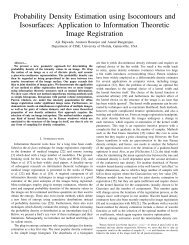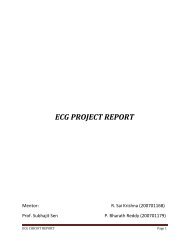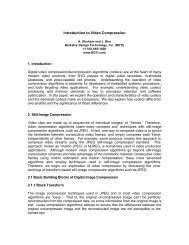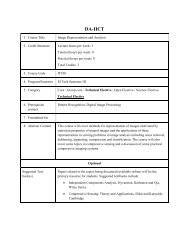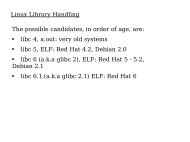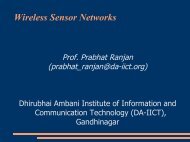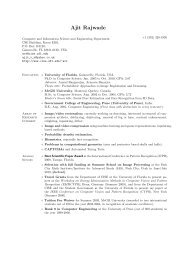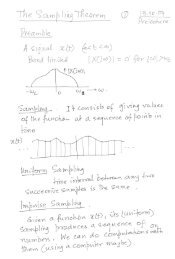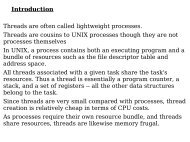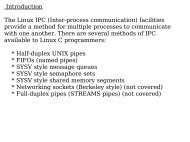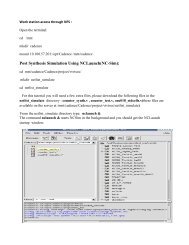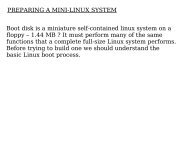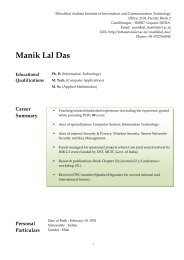CT537 ? Advanced Wireless Communications ... - DAIICT Intranet
CT537 ? Advanced Wireless Communications ... - DAIICT Intranet
CT537 ? Advanced Wireless Communications ... - DAIICT Intranet
You also want an ePaper? Increase the reach of your titles
YUMPU automatically turns print PDFs into web optimized ePapers that Google loves.
<strong>CT537</strong> – <strong>Advanced</strong> <strong>Wireless</strong> <strong>Communications</strong><br />
(credits: 3-0-0-3)<br />
Instructor: Dr. Laxminarayana Pillutla<br />
Email: laxminarayana_pillutla@daiict.ac.in<br />
Office: Room # 4203, Faculty Block 4,<br />
Telephone Extension: 621<br />
Introduction:<br />
The aim of the course is to introduce the students to some of the latest advances<br />
in wireless communications and networking. The course focuses its attention on<br />
the physical and MAC layer design aspects of wireless networks. The course will<br />
also introduce the students to some of the optimization theory related concepts,<br />
which are used extensively in the analysis of wireless networks. The course aims<br />
to keep a right balance between theory and practice. The course is open to fourth<br />
year undergraduate with good CPI and third semester M. Tech students. A good<br />
background in basic probability theory and random processes is required.<br />
However to make the course self contained few important probability theory<br />
concepts will be covered briefly. The course outline is as follows:<br />
Module 1: Mathematical preliminaries<br />
● Review of probability theory<br />
● Essentials of (convex) optimization theory.<br />
● Essentials of information theory.<br />
Module 2: <strong>Wireless</strong> channel models and latest multiple access<br />
technologies<br />
● Introduction to various channel models (namely frequency flat,<br />
frequency selective, Rayleigh and Ricean fading models).<br />
● Introduction to CDMA and associated standards.<br />
● Introduction to OFDM.<br />
Module 3: Capacity of scalar wireless channels<br />
● Introduction to the notion of channel capacity.<br />
● Capacity of time invariant channels.<br />
● Capacity of time varying (or fading) channels.<br />
Module 4: Capacity of vector (MISO, SIMO, MIMO) channels and spatial<br />
multiplexing<br />
● Capacity of MISO and SIMO channels for both time varying and time<br />
invariant cases.<br />
● Capacity of MIMO systems.<br />
● V-BLAST and D-BLAST<br />
● STBC and STTC.
Module 5: Multiuser detection (MUD):<br />
● Introduction to MUD.<br />
● Linear decorrelator.<br />
● MMSE MUD<br />
● Adaptive MUD<br />
Module 6: Application of convex optimization to wireless design<br />
● Minimizing PAPR in OFDM systems via convex optimization<br />
● Applications of convex optimization to MAC and flow control problems.<br />
Note:<br />
1. All the topics mentioned above are tentative. New topics may be added or<br />
existing topics may be deleted as required.<br />
2. Only one of the last two modules may be covered in case time is short.<br />
Text Book:<br />
1. Fundamentals of wireless communications by David Tse and Pramod<br />
Viswanath.<br />
2. Convex optimization by Steven Boyd and L. Vandenberge (available online<br />
at www.stanford.edu/~boyd).<br />
Reference Books:<br />
1. <strong>Wireless</strong> <strong>Communications</strong> by Andrea Goldsmith.<br />
2. Digital <strong>Communications</strong> by John Proakis<br />
3. Introduction to space-time wireless communications by Arogyaswami<br />
Paulraj, Rohit Nabar and Dhananjay Gore.<br />
4. Multiuser detection by S. Verdu.<br />
5. <strong>Wireless</strong> Networking by Anurag Kumar, D. Manjunath, Joy Kuri.<br />
6. Probability, Random Variables and Stochastic processes by A. Papoulis and<br />
U. Pillai.<br />
7. Non-linear programming by Dimitri P. Bertsekas.<br />
Text book rotation policy: The library has only one copy of the text book and<br />
hence that lone book need to shared by all (including me). Therefore I have<br />
decided to check out the book myself, and whoever is interested can check it out<br />
from me (by signing a sign out sheet) for a maximum of 3 days for their study. The<br />
duration of book check out may be reduced in case of heavy demand.<br />
Grading policy:<br />
● Home works: 20%<br />
● Pop (or Surprise) quizzes: 10%<br />
● Mid term exam: 20%<br />
● Final exam: 30%<br />
● Project: 20%<br />
About Projects: A list of project titles, which typically come from the leading<br />
IEEE journals will be provided to you as we progress. This will happen in the first<br />
two weeks of the course. The students are advised to go through the project titles
and pick one title that interests them. Alternatively, the students may suggest<br />
titles of their own. The project team size cannot be more than two. The<br />
students are required to submit their choice of project titles along with a brief<br />
summary of what they would like to accomplish as part of the project no later<br />
than September 15 th .<br />
The students are required to go through the paper and other relevant references,<br />
reproduce at least some of the important results of the paper and finally<br />
summarize to the class via a good presentation. A presentation slot of 15 minutes<br />
will be allotted to each group (you will be notified of the exact date in the due<br />
course). Finally the students are required to submit a detailed project report. As<br />
an incentive you can get an extra credit of 20% in case you propose a<br />
novel (I determine what is novel) idea.<br />
Note:<br />
1. In case of group projects, the project report should contain a detailed<br />
breakup of as how the project burden has been shared among both the<br />
members of the group.<br />
2. It is enough to submit one report per project team.<br />
Policy on typesetting: In order to familiarize the students with LATEX that is<br />
commonly used for typesetting research papers all the home works and the final<br />
project report need to be typeset via LATEX. Please submit the pdf output file as a<br />
hard copy or as a soft copy to: (laxminarayana_pillutla@daiict.ac.in) before the<br />
deadline.<br />
Policy on academic dishonesty and plagiarism: In case if a student is found<br />
to have resorted to unethical academic practices (such as copying home works,<br />
copying projects, copying during exams, claiming others work to be yours, etc.),<br />
then the DA-IICT academic honor code will be invoked. Typical punishment can<br />
vary from getting a zero in that particular home work/project/exam to an “F” in<br />
the course. Multiple offences would automatically lead to an “F” in the course.<br />
Note: However you are free to discuss about home works and projects with your<br />
fellow students, but when you put pen to paper it should be totally your work. I do<br />
not want to see verbatim similar copies of home works or projects.<br />
Office hours: In case if you have any doubt on the topics covered as part of the<br />
course you are welcome to see me on Tuesday and Thursday between 3:00 –<br />
4:00 PM. If these timings are not convenient to you please mail me an alternate<br />
time and day and I will try to accommodate you. Although I really appreciate if<br />
you can come and see me on the above mentioned days and times.<br />
Course Feedback: I always welcome constructive suggestions, so I would<br />
appreciate if you can drop a line and let me know as how the overall experience of<br />
the course could be improved.



